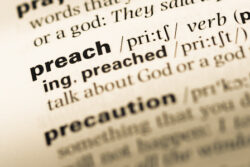Guest Preaching on Stewardship
Guest Preaching on Stewardship
This article is written by Nathan Kirkpatrick, an Episcopal priest who consults with congregations and organizations. Nathan teaches our Executive Certificate in Religious Fundraising course as an adjunct faculty member.
by Nathan Kirkpatrick
“Would you be willing to come to preach at my congregation?” Perhaps you know that particular invitation – and the joys and challenges that accompany it. Or perhaps you are the one extending the invitation – trusting, hoping that this other person can give you at least a week’s break.
Whether you are on the receiving or extending end of the invitation, guest preaching can be a real gift. For me, as a priest in the Episcopal Church, it has been almost two decades since I have served a congregation in a full-time ministerial capacity, two decades since I have lived the rhythm of daily church life and preparing for Sunday mornings. My work since then has been in theological education and in private consulting. While I have been involved in the life of a local congregation, guest preaching has been a life-giving way of practicing my vocation while also continuing to hone some homiletical skills. I have appreciated the colleagues and friends who have opened their pulpits to me, trusting me to say something in the name of God that is worth their congregation’s time.
The Gift of Being the Guest
Have you been there – the guest preacher covering a service or two? If so, perhaps you have also found the real vocational gift of being the guest. There’s something remarkable about stepping into other people’s holy spaces – observing, participating, and learning from what they do best (or at least better than others). There’s something about discovering your voice amongst strangers – what is the heart of “your faith tradition” in your own understanding and how do you articulate it to people you’ve never met before? How do you say something compelling when you cannot rely on relationship to carry the message? Being a guest can awaken new dimensions of vocation in each of us.
I have been especially grateful to those colleagues who have viewed an invitation to a guest preacher strategically. Guest preachers can do more than just cover for a vacation, after all. “Would you come and kick off our capital campaign?” or “Would you preach at the end of our annual campaign?” or “Could you preach at the unveiling of our new congregational mission and vision statements?” In each of these instances, the guest preacher gets to echo familiar themes in a different voice so that the congregation might hear new possibilities and fresh opportunities – perhaps some things that have been hidden in plain sight for the congregation.
The key, of course, is that the broader themes themselves must be somewhat familiar. There are limits to what a guest preacher can do.
Limits to Guest Preaching
Years ago, I received an invitation to preach a stewardship sermon at a congregation I did not know all that well. I knew the pastor well but the congregation only by reputation. When I talked to the pastor about the sermon, he told me that he needed me “to come and say the things about stewardship that I just can’t say.” His words caught me off guard, leaving me to ask, “what can’t you say about stewardship to your congregation?” His answer was simple – “I can’t say anything at all about stewardship.” His was one of that large number of American congregations that talk about money and stewardship on average one time or less per year. They had fallen captive to an understanding that money was an entirely private matter never to be discussed in church. I had to tell him that, as much as I appreciate him as a friend and colleague – and as much as I felt for him in that predicament, no guest preacher should accept that invitation.
Beginning a congregational conversation about money, stewardship, and generosity requires relational capital. You cannot outsource this. The preacher who initially broaches the conversation about how we gain, use, and give our money must be the same person who has prayed by the bedside of the sick, who has celebrated the birth of children, who has been by the graveside, and who is available at coffee hour week by week. Guest preachers, for all that we can do to support the leadership of our colleagues, cannot be the ones to begin that conversation. Shifting congregational money mindset requires that people trust the preacher who is inviting them to do so.
My friend was disappointed that a guest preacher wasn’t the answer to his problem. Instead, he and I worked to develop an educational plan for his congregation that would position them to hear a guest preacher about stewardship and generosity just twelve months after our initial conversation. When the time came for the guest preacher to preach, she contributed to the conversation about money and generosity mightily – but she did not begin it, nor did she carry it singlehandedly. The congregational leader had done the hard work of introducing the topic of faith-filled giving, which made space for a guest preacher to offer a new word of insight or challenge to the congregation. In the end, that hard work was worth it.
 Nathan Kirkpatrick is an Episcopal priest and a principal consultant at Saison Consulting. He has worked with a number of nonprofit institutions, principally faith-based, designing and facilitating their planning processes. In addition to his work at Saison, he serves as an adjunct faculty member for the Lake Institute on Faith & Giving (part of the Lilly Family School of Philanthropy at the Indiana University – Purdue University), The Episcopal Preaching Foundation, and The Texas Methodist Foundation. He was previously the Director of Alban at Duke Divinity School (formerly the Alban Institute), a globally recognized congregational consulting company. He has contributed chapters to four books about parish leadership and is working to finish his first book. He holds degrees from Wake Forest University and Duke University. He has done further study in religion and psychology at Durham University in Durham, U.K.
Nathan Kirkpatrick is an Episcopal priest and a principal consultant at Saison Consulting. He has worked with a number of nonprofit institutions, principally faith-based, designing and facilitating their planning processes. In addition to his work at Saison, he serves as an adjunct faculty member for the Lake Institute on Faith & Giving (part of the Lilly Family School of Philanthropy at the Indiana University – Purdue University), The Episcopal Preaching Foundation, and The Texas Methodist Foundation. He was previously the Director of Alban at Duke Divinity School (formerly the Alban Institute), a globally recognized congregational consulting company. He has contributed chapters to four books about parish leadership and is working to finish his first book. He holds degrees from Wake Forest University and Duke University. He has done further study in religion and psychology at Durham University in Durham, U.K.
Questions for Reflection
-
- Does your congregation invite guest speakers to speak about stewardship? If so, how do you prepare the congregation? How do you prepare the guest speaker?
- Have you been invited to offer a stewardship sermon as a guest preacher? Do you resonate with Nathan’s comment about saying “no” to a request?
Expanded Perspective
 by Meredith McNabb
by Meredith McNabb
Whether one is a guest speaker or the usual leader in a congregation, the content of what to say about giving deserves some careful consideration. A sermon is not actually the same as a fundraising speech, even if the occasion may have been set aside as a key part of a congregational giving campaign. A preacher or teacher is meant to be going deeper into sacred scripture and helping the listeners to understand and respond within their spiritual tradition—not actually just to push a campaign over the top of its stated goal. (Rabbi Adam Miller, member of Lake Institute’s Advisory Board, once observed that perhaps the most successful fundraising example in the Torah is actually Aaron’s solicitation of the Hebrew people to build the idolatrous golden calf in Exodus—hardly the example that any of us would want to follow today!)
One approach to preaching on the topic might be to examine what one’s tradition teaches about money, or the right use of money, more broadly. This is different than making the case for why one should give to this particular congregation—that might be better left to a non-sermon speech or invitation. Scholar Walter Brueggemann observes how diverse that teaching can be even within just one tradition: he points out that within the Christian canon, money can be a blessing or a temptation, it can be a source of neighborly sharing or social injustice, it can be a reward or something only on loan to use for the community.¹
There’s so much more to say in a preaching or teaching opportunity beyond “please make your gift today for these reasons.” That’s a great and meaningful speech, too—but it’s different than religious preaching or teaching. Take the opportunity as a guest or as a regular leader to approach the subject with the depth that it deserves.
¹See Brueggemann, Walter, Money and Possessions. Louisville, KY: Westminster John Knox Press (2016). Excerpted at https://www.wjkbooks.com/Content/Site117/FilesSamples/294459MoneyandP_00000024611.pdf
Preaching on Stewardship
 We have a variety of resources in our Resource Library on the topic of Preaching on Stewardship. You can read Insights articles by our Lake Institute staff, articles written by adjunct faculty, as well as resources from the former Ecumenical Stewardship Center on specific themes you can use in worship. We invite you to explore the Resource Library and discover new tools for your preaching toolbox!
We have a variety of resources in our Resource Library on the topic of Preaching on Stewardship. You can read Insights articles by our Lake Institute staff, articles written by adjunct faculty, as well as resources from the former Ecumenical Stewardship Center on specific themes you can use in worship. We invite you to explore the Resource Library and discover new tools for your preaching toolbox!
Professional Doctorate in Philanthropic Leadership
As the world’s first school dedicated to the study and teaching of philanthropy, Indiana University’s Lilly Family School of Philanthropy now offers the first Professional Doctorate in Philanthropic Leadership (PhilD). If you have served as a senior leader for the public good, whether in the philanthropic, government or private sectors, already have a master’s-level or other graduate degree and wish to explore real-world solutions for current challenges through philanthropic and nonprofit solutions, the Professional Doctorate in Philanthropic Leadership may be an excellent fit for you.
The next information session to learn about the PhilD, ask questions, and meet Director Cindy Lott is on August 1.
Subscribe
Insights, a bi-weekly e-newsletter, is a resource for the religious community and fundraisers of faith-based organizations that provides:
- Reflections on important developments in the field of faith and giving
- Recommended books, studies and articles
- Upcoming Lake Institute events


